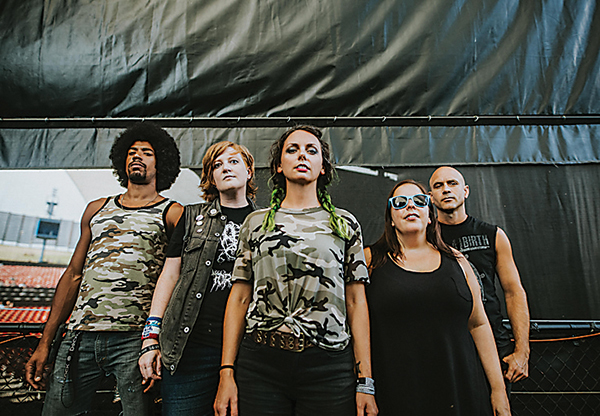Arts & Culture
Female Trouble
Shawna Potter of War on Women talks music and the #MeToo movement.
You’ve been writing
feminist music since 2011. How has our recent national conversation influenced
your songwriting?
It’s really interesting to be in a band that has a focus
like feminism. Issues constantly come up that make me feel like I have
something to say. But it’s also exhausting. Talking about gender-based violence
and sexual assault and the unequal treatment of women can really get
you down. For this record, it was the first time I let myself take a break. . .
. Instead of writing songs about every single thing that [President] Trump
says, or every single attack on women’s reproductive rights, I meditated on
specific topics. It was a real creative challenge.
Did that allow you to dig deeper?
It allowed us to not write a record solely about Trump. There is plenty to write about when it comes to our current administration, but I think this is a good time for people who have been less political to start getting involved—to step up and start talking about these issues. I still ended up writing about him in “Predator in Chief,” but that song actually represents a lot of men in powerful positions who abuse their power and hurt women.
What was it like watching the #MeToo movement unfold?
My gut reaction was kind of like,
“Welcome.” I’ve been running the Baltimore Hollaback! chapter since 2011,
talking to people about street harassment every day since I founded it. For me, seeing other people really come to terms with how prevalent sexual harassment
actually is, and really realize that we need to do something about it, it’s a beautiful
thing. I’ve tried cultivate
allies instead of making them feel guilty. It’s like,
you’re here now, let’s get to work.
What’s it like being
a woman at the head of a hardcore punk band, which has traditionally been a male-dominated genre?
It’s really
cool to be able to present these kinds of messages through a type of music that
is obviously not for everyone. It’s aggressive, angry music, and I think, at the same time, for
some people, if we were just playing folksy, Lilith Fair kind of stuff, they
would never hear it. . . . We’re presenting female anger in a way that people
are not used to. People traditionally like women to be angry in cute,
acceptable, non-challenging ways. We push that limit, and yet our music is very
femme. I am not one of the boys. I am not doing an impression of a male singer.
I really do sound like a woman, like myself. And I’m pissed.
Would you say that War on Women‘s new album, Capture the Flag, is for the oppressors or the oppressed?
I like to think it’s for
everyone. We can all do better. We can all be allies for someone else. Yes, I’m
a woman, I deal with discrimination—everyday sexism, “light” sexual harassment,
you might say. But I have no idea what it’s like to be a black woman. I have no
idea what it’s like to be a trans woman. I need to make sure that I am a
good ally for them, too.
What do these songs embody for you?
The title makes it pretty clear. There are politicians currently in power who are playing games with peoples’ lives. They are
literally putting lives at risk with policies that they are or are not putting
through. Restricting health care. Deporting people. Encouraging bullying and
anti-trans hate. This album is a critique of what they’re doing to us, who they claim to
represent, and, hopefully, it’s a call to action to remind ourselves that there
are more of us than them. Let’s start representing what America actually looks
like.
